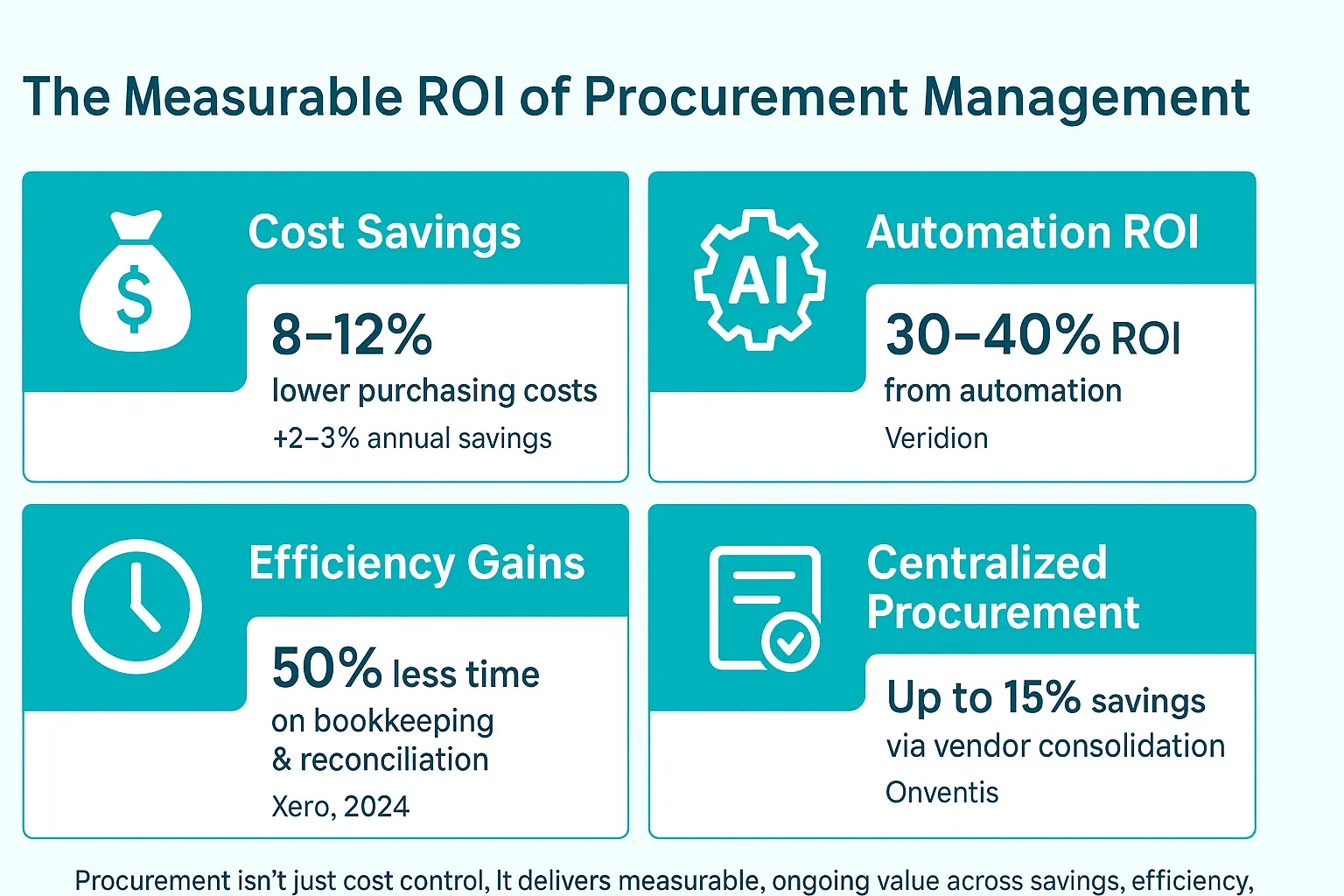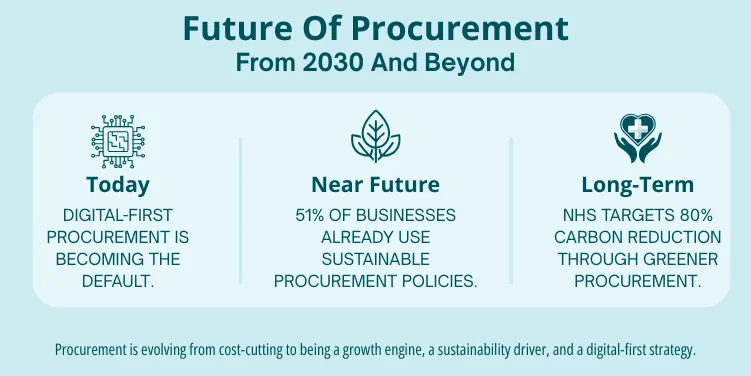The management of procurement may seem to be a complicated business term, but it is as simple as it sounds. It is the process of acquiring the correct goods and services in the proper place, at the appropriate time, and at the correct cost. In short, it’s the backbone of how organizations control costs, manage risks, and maintain supply chain stability. It sounds easy, yet in practice, it is one of the most difficult jobs in business.
The importance of procurement management is that it introduces structure and control into this process. It also strengthens supplier relationships and provides long-term value through smarter decision-making. Businesses that neglect procurement often face problems of bottlenecks, inappropriate selection of suppliers, inconsistent supply quality, wastage of money, and operational delays. In contrast, companies that approach procurement strategically gain measurable benefits, such as achieving speed, improved prices, stronger supplier performance, and better supplier relations.
Now in the competitive world, procurement is not only about buying. It’s a supporting function which involves value creation, minimization of risks and construction of wiser strategies. This makes procurement a core driver of business growth and efficiency.
What is Procurement Management?
Procurement management is a structured process of planning, sourcing, negotiating, and managing the acquisition of goods and services that a business requires to operate. It is not just about purchasing goods and services, but about creating the proper supplier relationship and about ensuring all purchases bring value.
The role of purchasing has extended well beyond its boundaries in the modern business. It ensures that sourcing suppliers is done strategically, supplier relationships are nurtured, and procurement challenges like cost control, compliance, and risk are effectively addressed.
Why Strong Procurement Practices Matter in Today’s Global Market?
Nowadays, the supply chain is in a close relationship with procurement management. When properly implemented, it will enhance efficiency in operations, lessen risks and establish hassle-free processes. Planergy states that the right procurement can assist a business to surpass the issues of unreliable suppliers, cost concealment, and invisibility via a high-quality procurement process. It is equally strategic in the selection of suppliers, negotiation of better contracts, and has ensured that enterprises remain competitive in the ever-evolving markets.
The criticality of procurement management becomes evident when we realize how it complements cost management, serves to enhance smarter planning, and is more resilient in terms of global disruptions. To understand the application of these concepts, various procurement management practices across industries would provide an insight into how businesses practice these strategies to match their individual requirements.
Key Benefits of Procurement Management
The advantages of procurement management are much more than just a couple of extra dollars. When it is done right, it transforms the way companies spend, develop and fight it out. It serves as a strategic function that strengthens every layer of operations.
- Cost Savings
- Risk Management
- Supplier Performance
- Operational Efficiency
- Transparency & Compliance
1. Cost Savings
Strategic sourcing and vendor negotiations help businesses lower expenses without compromising quality. The money talks, and the procurement ensures that the money talks sensibly. Businesses save on bulk purchase costs, negotiating and comparing the suppliers, therefore, saving a lot.
According to Bain & Company, world-class procurement organizations can reduce purchasing costs by 8–12%, while delivering an extra 2–3% in annual savings through continuous improvements.
2. Risk Management
Markets change, suppliers collapse, and unforeseen disturbances occur. Effective procurement management identifies these and mitigates supply chain risks such as price volatility, single-supplier dependency, or compliance issues. It minimizes these risks through backup plans, multiple suppliers and market trend tracking. Because of this, businesses remain calm and in control, rather than panicking when faced with a crisis.
3. Supplier Performance
Like good teammates, good suppliers can spell success or failure. Strong procurement practices foster better supplier relationships, ensuring timely delivery, innovation, and higher product quality. Their aim is to develop healthy relations with suppliers, establishing the expectations and monitoring the performance. Suppliers will deliver more consistently, with operations getting more seamless, and trust will grow on both sides.
4. Operational Efficiency
Companies tend to purchase independently, wasting time and resources without procurement. Streamlined procurement processes reduce delays, improve workflows, and allow teams to focus on high-value tasks instead of manual approvals or bottlenecks. The approvals for payments can be carried out with increased speed and efficiency. This liberates teams to concentrate on expanding rather than pursuing invoices or late deliveries.
5. Transparency And Compliance
The process of procurement maintains things in a clear state. All purchases are recorded, all suppliers are verified, and all contracts are connectible. Such a degree of transparency helps curb fraud, enables one to meet regulations, and makes leaders trust in any decision.
These benefits make procurement indispensable not just for manufacturing or retail, but also in construction and contracting projects in the Gulf, where cost efficiency, compliance, and supplier reliability can directly impact project success. Proper procurement provides businesses with a competitive advantage, along with avoiding a bloated process.
👉 For a deeper dive into leadership responsibilities, check out our guide on the Role of the Procurement Manager in an Organization.
Advantages of Procurement Management
The benefits of procurement management are not only related to cost savings, but also the ability to stay ahead. In the modern reality, a company is not only measured by profit but also by responsibility. That is where procurement comes in and changes the game.
-
Competitive Advantage
Companies with robust procurement strategies gain an edge by securing better suppliers, accessing innovation, and achieving consistent quality. As PayEm highlights, procurement is now viewed as a strategic driver of growth, not just a cost-control function.
At Delta Gulf Overseas, we develop strategies to enable our clients to have a greater competitive advantage in the marketplace. We do their heavy lifting by smarter buying, trusted suppliers and greater speed of operation, which gives them the ability to concentrate on growth.
-
Sustainable Procurement
Integrating Environmental, Social, and Governance (ESG) principles ensures ethical sourcing, reduced carbon footprints, and a stronger brand reputation.
We do not take this lightly at Delta Gulf Overseas. Here we are implementing the reduction of waste, the selection of greener vendors and ethical standards. Our procurement strategies are coordinated towards global sustainability endeavors.
-
Supply Chain Resiliency
Businesses that diversify suppliers and adopt proactive procurement planning can adapt quickly to disruptions such as global shipping delays or raw material shortages. With the possible impact of global upheavals being potentially devastating, a strong procurement helps to maintain operations normal.
As an example, procurement has a significant effect on other industries, such as the medical field. Investigating the topic of sustainable procurement practice in healthcare settings examines how companies are able to control costs and maintain social responsibility.
At Delta Gulf Overseas, we view procurement as not only a simple function but a growth engine, a sustainability driver, as well as a risk shield. Our systems are flexible, resilient to supply breakdown and prevent expensive downtime. This is not only to keep the business growth, but it also maintains trust among the clients and the stakeholders.
Real-World Impact: Procurement Automation & ROI
Does anybody still run procurement based on spreadsheets and mountains of emails?
Well, yes, some poor souls are still juggling procurement with spreadsheets and endless email chains. If that’s you, then that’s seriously sad. It’s like using a flip phone in the age of smartphones! 😢
Modern businesses are moving from manual spreadsheets to AI-driven and data-based procurement tools, and the payoff is undeniable. Procurement automation isn’t just about convenience; it directly boosts efficiency, accuracy, and profitability. Automation tools are changing the landscape of how businesses purchase, monitor and manage resources. Technology is evolving the game with AI-assisted contract optimization and data-driven sourcing platforms.
Higher ROI
According to Veridion, automation delivers 30–40% ROI by cutting errors, speeding up approvals, and improving compliance. The outcomes are self-explanatory, and this entails fewer errors, quicker authorization, and better reporting.
Time Savings
Automation is also time-saving. The Xero Efficiency Benchmarking Report (2024) found that companies using automation achieved a 50% reduction in bookkeeping and reconciliation time, freeing teams to focus on strategy instead of repetitive tasks. The more time that you can spend on planning and not on the paperwork.
Smarter Decision-Making
With real-time analytics, businesses can compare suppliers, predict risks, and manage spend with more confidence. This change not only occurs in technologically focused industries. In even traditional areas, including strategic procurement processes in the energy sector, automation is reducing costs and enhancing resilience.
Effective Procurement Strategy: Core Pillars
The efficient procurement strategy does not imply a checklist, but it is a basis of long-term business development. It provides structure to how organizations source, negotiate, and manage suppliers while keeping long-term goals in mind. The leaders must have measurable, implementable pillars at the decision stage that can lead to effectiveness and sustainability. It’s not just about purchasing, it’s about building a foundation for efficiency and resilience.
1. Strategic Sourcing
Identifying the right suppliers and negotiating based on total value, not just price. Strategic sourcing involves selecting the suppliers that can bring value, consistency, and be attuned to the business objectives.
2. Centralized Procurement Systems
Waste occurs through fragmented purchasing. Centralization unifies everything into a single system, approvals are quicker, and reporting is easier. A report by Onventis shows that centralized procurement can reduce costs by up to 15% through vendor contract consolidation. That has a direct effect on the bottom line.
3. Vendor & Supplier Relationship Management
Effective supplier relations produce long-term benefits. Strong, transparent relationships reduce risk and improve service levels. This is not just an aspect of negotiating lower prices but also of trust, collaboration and innovation. An excellent procurement strategy develops relationships rather than one-shot transactions.
4. Spend Visibility & Data-Driven Procurement
Real-time analytics enable better forecasting and accountability. You can not control what is not visible. Data-based procurement is transparent when it comes to every dollar. This goes all the way to dashboards and analytics, where the business can find out leaks as well as track performance and make smarter decisions.
5. Risk Management & Compliance
There are unpredictable and unforeseen regulatory, financial, or environmental risks that can derail whole supply chains. A good purchasing strategy will establish safeguards through checks in compliance, having alternative sources and an understandable process. Protects businesses from supply chain disruptions, fraud, and regulatory issues. This makes continuity possible even in the case of challenges.
At Delta Gulf Overseas, we frame our strategies around these pillars. Whether it is smarter sourcing or risk-proof planning, our approach can be crafted to work in line with the long-term objectives. Even tricky areas, such as hospitality projects, where FFE and OSE considerations in long-term planning must be factored into sourcing and budgeting decisions. When a strategy is well constructed, it will not only reduce the expenditure but will also market stability, build confidence and place businesses to make sustainable growth.
Case Study & Industry Applications
Procurement management isn’t one-size-fits-all. Each industry has different problems, and procurement should adjust in accordance with them. Best practices differently, depending on its scale, regulations, and customer expectations. Below are examples of how procurement strategies create measurable impact across sectors;
-
Hospitality
The hotels and the resorts operate on details. The procurement should include everything, including kitchen equipment, furniture, and guest amenities. Hotels and resorts depend on partners that offer full-scope procurement for hospitality to source everything from building materials to furniture, fixtures, and equipment (FFE). A McKinsey survey highlights that hospitality firms leveraging centralized procurement cut supplier costs by 10–15%, while improving consistency in guest experience.
Delta Gulf Overseas views this as a tool to allow hospitality brands to concentrate on guest experience, rather than tracking down suppliers. Here, the thing is to be consistent: to have the same kind of linens, décor, or equipment in all properties to safeguard the brand image.
-
Healthcare
Hospitals do not have time or tolerance for mistakes in supplies. In hospitals and clinics, sustainable procurement practices in healthcare settings are tied directly to ESG (Environmental, Social, and Governance) goals. In line with the objectives of ESG, procurement teams have started to seek out eco-friendly production materials, energy-efficient gadgets, and items that are manufactured ethically.
For example, the NHS (UK) is committed to reducing its carbon footprint by 80% by 2036–2039 through greener procurement policies, proving how sustainability can align with long-term compliance. It demonstrates that procurement contributes both to patient care and sustainability directly.
-
Office and Residential Projects
Developers adopt efficient sourcing for office and residential projects to avoid delays and reduce costs. According to Deloitte’s Construction Industry Outlook (2024), firms with digital procurement systems reported 25% faster project delivery compared to traditional methods.
At Delta Gulf Overseas, we facilitate the management of these intricate conditions on behalf of clients through centralized procurement centers that prevent duplicity as well as accelerate delivery.
The key takeaway reigns across these industries, where procurement flexes. Be it the excellence of hospitality, the life-saving necessity of health care or the massive needs of residential projects, procurement defines the results delivered and directly adds value.
Future of Procurement Management
Procurement management is set to become smarter, faster, and greener in the future. The future of procurement is being shaped by AI-driven tools, automation, and sustainability goals, transforming how businesses measure success. Companies are no longer just focused on cutting costs; they’re prioritizing procurement process optimization to improve agility, resilience, and decision-making.
AI & Automation
The use of AI in procurement has varied, with tasks such as automated approvals and predictive sourcing being optimized to streamline the process. Predictive demand forecasting to real-time spend analytics, procurement automation is helping organizations reduce manual errors, accelerate approvals, and benchmark procurement KPIs with precision.
Research from the AIU Blog suggests that digital-first procurement will soon be the default, not the exception. Such visibility leads to transparency in procurement that, in turn, leads to trust along the supply chain.
Sustainability & ESG
The other great transformation is sustainability. According to ProcurementTactics, 51% of global businesses have sustainable procurement policies that enhance value chain resilience. This shows that the green choices can no longer be optional, but instead, it is a competitiveness and reputation requirement. Transparent supplier audits and greener sourcing practices are becoming standard, ensuring greater transparency in procurement while aligning with ESG mandates.
These trends are already in use at Delta Gulf Overseas. We automate, encourage ESG-friendly behaviours, and develop such approaches that can make procurement future-proof. This future provides a critical reason why companies seeking to remain competitive, resilient, and sustainable need to select a partner that recognizes that future. That is where we show up, because there is simply no better procurement management choice like us today, or tomorrow.
Conclusion
The importance of procurement management cannot be overstated; it’s the backbone of cost savings, supplier reliability, and operational resilience. The significance of purchasing management deserves no emphasis. It is the power behind controlling the costs and the power that forms the resistance in the supply chain, as well as getting the businesses prepared for the future. From building effective strategies to leveraging automation, procurement is no longer just about sourcing goods; it’s about shaping a stronger, more sustainable business model.
The path forward lies in combining strategic procurement frameworks with automation-driven insights, ensuring that businesses remain competitive and resilient in a changing global market. When automation and strategies are used together, the outcomes are obvious: intelligent sourcing, cost savings that could be measured, and sustainable and long-term balance. The dynamic environment in a modern competitive world does not require businesses to have a purchasing function only. They need a partnership that could align procurement to growth, compliance and sustainability.
👉 Partner with experts in procurement to optimize sourcing and unlock long-term value.
At Delta Gulf Overseas, that is what we are providing. We support companies in the transition to turn procurement into a value engine, including through strategic sourcing and automation-driven solutions.
Frequently Asked Questions On Procurement Management
What are the key benefits of procurement management?
The main advantages of procurement management include cost control, stronger supplier relationships, and greater operational efficiency. According to Bain & Company, world-class procurement organizations can cut purchasing costs by 8–12% and deliver an extra 2–3% in annual savings, making procurement one of the most impactful areas for business growth.
How much ROI can organizations expect from procurement automation?
Automation of procurement provides quantifiable pay off. According to Veridion, automation provides 30–40% ROI by reducing manual errors, speeding up approvals, and improving compliance. For businesses, this means less time wasted on repetitive tasks and more focus on strategy, wishing to modernize their activities.
What are real-world examples of savings from procurement automation?
Time efficiency is just one of the obvious examples. Xero’s 2024 Benchmarking Report found that automation achieved 50% time savings in bookkeeping and reconciliation. This gives the businesses less stress on paperwork, faster order processing and reduced administrative overhead.
How does centralized procurement help reduce costs?
A centralized procurement saves wastage and consolidates suppliers’ contracts. It causes huge savings. According to the Onventis report, a centralized procurement system can save organizations 10–15% on costs. This approach improves visibility, reduces duplication, and strengthens negotiation power with suppliers.
What strategy improves supplier performance and sourcing quality?
The proven method is Supplier Relationship Management (SRM). This is one of the most effective strategies. A Wikipedia report shows that SRM systems unlock 10–30% savings, and it also improve supplier reliability and long-term sourcing quality. It enhances the relationship with suppliers, promotes teamwork and leads to improved quality.







